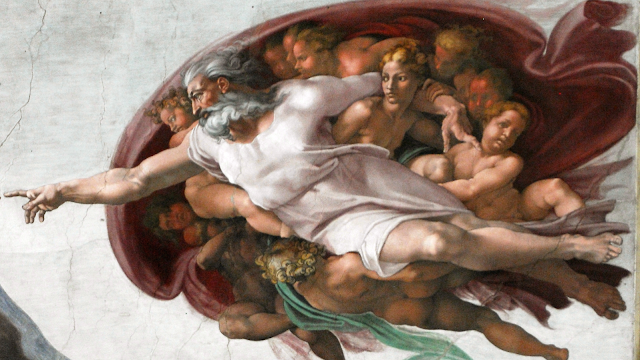God the.....
 |
| The Creation of Man - Michelangelo |
Lately I've attended events where the issue of addressing the gender of God has come up. In addition to that, I follow a few progressive Christian women who refer to God in the feminine gender - they use my grandmother's dreaded pronoun "She". And this weekend I've been at the Synod Assembly for the Pacifica Synod of the Evangelical Lutheran Church in America, during which time we reviewed a resolution to allow for a gender-neutral stance on how we refer to God.
So, this is something that now is facing me, and I feel I must personally address it. Not necessarily for you, my readers, but for me - for myself. How do I refer to God?
First off, I will state that I believe in a God that is outside of time and space, and is a God that man cannot, and never will, fully comprehend. We as finite human beings must therefore find ways that we can explain him, which we've been doing for millennia. We try to contain God into a jar that allows us to wrap our heads around him (sorry, but not ready to make my final point yet, so allow me to refer to God in the male gender for a bit more). We are blessed with many theologians who do see God outside of our pale human reference, but that tends to be a bit rare. So, to state my first point, God is beyond our comprehension and understanding, so therefore, we cannot know what God's gender may be, or even if God has a gender.
Second, we must look at the context of scripture, writings that have been collected over thousands of years, and used narratives and allegory to explain the God that they could not understand. You need to understand that traditional Hebrew and Jewish societal norms are based on patriarchal dominance, and in some Orthodox practices, women and men are to remain separate. Men have the leadership roles, including head of the household, head of the spiritual nature of the household, and bringer of income. This is the background of which both Old Testament and New Testament scripture is based - the male is the dominant and controlling figure. Therefore, it is easy to understand why scripture is heavily laced with God as a father figure, God as male. Even in the Gospels Christ refers to himself as the Bridegroom. So, my second point is we must understand the nature of where the male gender assignment to God originated.
Now, before you go off and comment "well, Jesus himself (male gender) referred to himself as the 'bridegroom', which must mean that since he was God incarnate, God is therefore male." Or if you site St. Paul's first letters to the Corinthians and to Timothy, he writes about women and their subservient roles in the church. Again, you must understand the context of that time to place Paul's writings in the proper place that they should be. He was writing in a male-dominated world. Paul omits in his documentation of the witnesses of Christ's resurrection any reference to women. Some may cite Paul as misogynist, but I think he was writing in that context of time. And as to Jesus referring to himself as the bridegroom, well, he was male, so why would he refer to himself as the bride? Again, one must understand the contextual and cultural elements of the time in order to understand why God was considered to be male.
So, what do I believe? What gender is God?
I have come to the conclusion that God relates to us in spirit, so first of all, to assign a gender to God is futile and foolish. I am sure that we will have a large portion of Christian women (and other faiths that believe in God or Allah) that will always refer to God in the male gender. And I'm sure that we'll have a portion of Christian women and men, that will embrace God in the female gender because women are projected as natural caregivers: the ones that feed us and give us life. And many of our ancient indigenous cultures around the world saw the creator or great spirit as female, because of the correlation between giving life and nature giving life.
So, with that in mind, what do I personally believe - is God male or female for me?
I think that this not a theological question at all, which I hope my arguments above have supported. I believe it is a relational question: how do I relate to God in the sphere of gender? And that, granted, is not easy. Since I have, from my childhood on, experienced God in the male gender, and see this as a deeply personal relationship, I see God as male. But I respect those (both women and men) who may relate to God as female. I have no issue with them relating to God in that way.
The only other way I can explain it was in my own personal narrative. I had a tenuous relationship with my dad that improved to the point where as I got older, he and I became friends. And my mother, who I loved, and who loved me, was over-protective. As I got older she became someone with whom I was not as close to as I was to my dad. I confided in my dad and sought out his counsel. Not so much my mom. My relationship with my dad, Abba, Father, became one of paramount importance.
So, for me, God is Father.
I think that this not a theological question at all, which I hope my arguments above have supported. I believe it is a relational question: how do I relate to God in the sphere of gender? And that, granted, is not easy. Since I have, from my childhood on, experienced God in the male gender, and see this as a deeply personal relationship, I see God as male. But I respect those (both women and men) who may relate to God as female. I have no issue with them relating to God in that way.
The only other way I can explain it was in my own personal narrative. I had a tenuous relationship with my dad that improved to the point where as I got older, he and I became friends. And my mother, who I loved, and who loved me, was over-protective. As I got older she became someone with whom I was not as close to as I was to my dad. I confided in my dad and sought out his counsel. Not so much my mom. My relationship with my dad, Abba, Father, became one of paramount importance.
So, for me, God is Father.


Comments